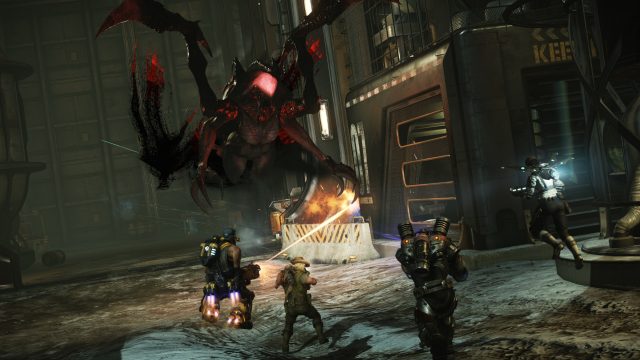
"Making Evolve free on PC is going to be a process that takes time and a lot of hard work, but we believe in Evolve and we believe in you, our players and want to do what’s best for both," Turtle Rock wrote in a blog post late last night.
So far, Turtle Rock hasn't announced how it plans to make money off the new, free version of Evolve. According to an extensive Turtle Rock interview with Game Informer, everything in the game will be unlockable via "silver keys" earned during play. As of now, those keys cannot be purchased for actual money.
Those who paid for the previous version of Evolve as recently as this week will keep everything they've already unlocked. Previous owners will also get "Founder's Status" on the new version of the game, entitling them to weapon skins, animated badges, and thousands of those content-unlocking silver keys.
The move to free-to-play comes alongside a massive rebalancing intended to make the game more satisfying both for monsters and the teams of hunters trying to take them down, according to the Game Informer interview. All players will now have access to the monster-trapping dome, for instance, and that dome will no longer be able to completely miss the monster. Hunters will also see their health slowly recharge, which will make it less frustrating to play with an inexperienced medic. Turtle Rock also promises more frequent patches that will improve stability, load times, and "overall performance."
The only move available
Switching to a free model is an almost inevitable move when you consider the state of Evolve's online player base. In early 2015, the game rode strong pre-release hype and decent initial reviews to a healthy peak of over 27,000 simultaneous players just after launch, according to data from SteamCharts. That early success came despite a confusing, tiered pre-purchase structure that drew criticism for giving certain players early access to certain content.Since launch, though, the game has seen a long and steady decline in popularity. Today, on average, only 100 people are playing via Steam at any point. For context, a shooter like Left 4 Dead 2 still averages over 10,000 simultaneous players years after its release.
A tepid player response like this should be a death knell for a title that relies on being able to easily find well-matched teammates and opponents for quick online games. This type of player base pressure has already driven the vast majority of MMOs to transition to free-to-play in recent years; practically all of the PC's highest-earning titles are now free-to-play online games.When your game's appeal depends on getting as many people in the door as possible, fewer publishers are finding it makes sense to charge those players from the moment they walk in. But there are exceptions. Blizzard's recent launch of Overwatch has managed to attract a whopping 10 million total players despite using the more traditional pay-once-and-play-forever business model (already up from 7 million during its launch week). Perhaps the key to turning an online game into a successful business is simply making a game that people continue to want to play (and encourage their friends to play) long after the launch novelty has worn off. Imagine that!
reader comments
56